
- Home
- Brand
- Material
- Religion
- Soldier Type
- Type
- Action Figure (66)
- Armor (29)
- Badge (18)
- Boot (27)
- Carburetor (204)
- Complete Carburetor (27)
- Complete Carburettor (33)
- Helmet (23)
- Jacket (20)
- Manifold (14)
- Medal (16)
- Military -- Aviation (15)
- Model Kit (13)
- Rc Tank (40)
- Tactical Vest (18)
- Tank (46)
- Throttle Body (47)
- Twin Carburetors (44)
- Twin Carburetors Kit (37)
- Wristwatch (53)
- Other (3365)
- Year
1969 Poster ISRAEL INDEPENDENCE DAY Jewish JUDAICA Hebrew RABIN Dayan IDF EMBLEM
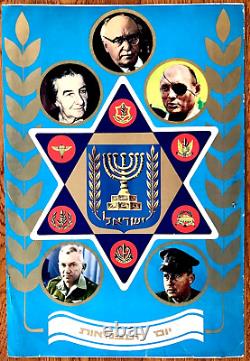
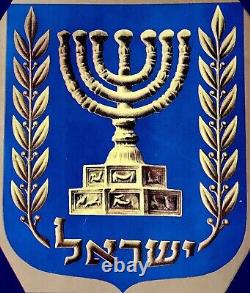


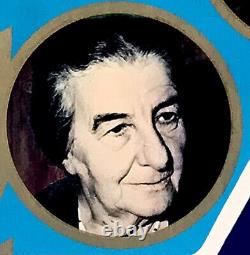
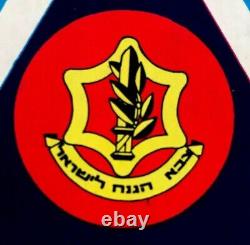
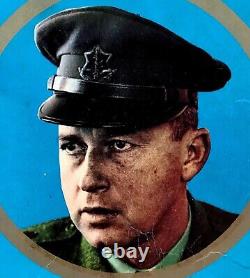
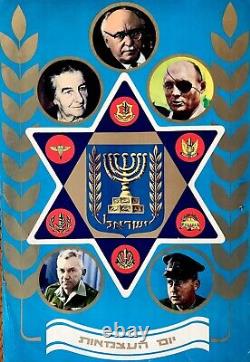
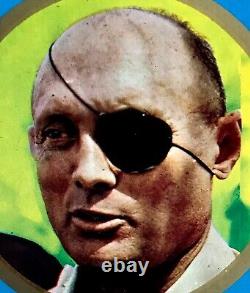
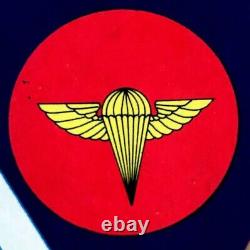
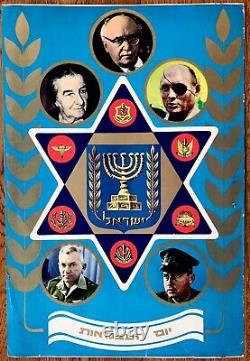
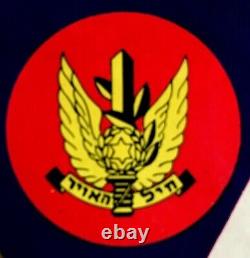
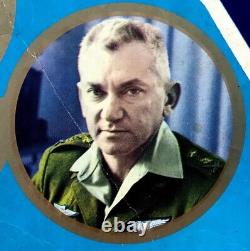
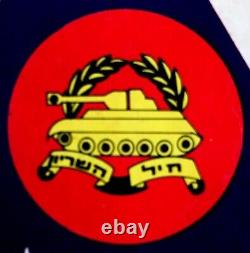

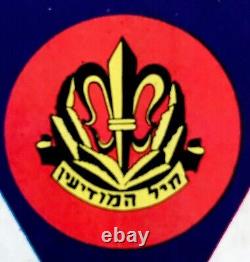
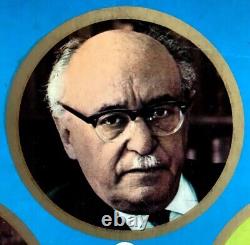


DESCRIPTION : Here for sale is an ORIGINAL Judaica Zionist poster which was published in the 1969 up to 1970 to commemorate and celebrate the 21th ISRAEL DAY OF INDEPENDENCE - HE IYAR (Iyar month Fifth). The colorful 1969 Independence poster depicts quite a few JEWISH - HEBREW - ISRAELI IKONS - The ISRAEL FLAG, The ISRAEL STATE EMBLEM, GOLDA MEIR the prime minister, Moshe Dayan the minister of defence, Chaim Barlev the Chief of Staff of the IDF - ZAHAL, and Zalman Shazar - The PRESIDENT of ISRAEL, Also present is GENERAL YITZHAK RABIN.
Additional IKONS - All the IDF UNIT EMBLEMS - Infantry, Paratroopers, Airforce, Navy. Size around 20 " x 14". Very slightly worn (Pls look at scan for accurate AS IS images).Will be sent roled inside a protective sealed rigid packaging. Poster will be sent rolled in a special protective rigid sealed packaging. "Independence Day" is the national day of Israel, commemorating the Israeli Declaration of Independence in 1948. It is celebrated on 5th of Iyar according to the Hebrew calendar.
Yom Ha'atzmaut is preceded by Yom Hazikaron, the Israeli Fallen Soldiers and Victims of Terrorism Remembrance Day Yom Ha'atzmaut centres around the declaration of the establishment of the State of Israel by The Jewish Leadership led by future Prime Minister, David Ben-Gurion, on 14 May 1948. This was declared eight (8) hours before the end of the British Mandate of Palestine, which was due to finish on 15 May 1948. The operative paragraph of the Declaration of the Establishment of State of Israel of 14 May 1948 expresses the declaration to be by virtue of our natural and historic right and on the strength of the resolution of the United Nations General Assembly. The operative paragraph concludes with the words of Ben-Gurion, where he thereby declares the establishment of a Jewish state in Eretz Israel, to be known as the State of Israel. The new state was quickly recognised by the Soviet Union, the United States de facto, and many other countries, but not by the surrounding Arab states, which marched with their troops into the area of the former British Mandate.Most of the official events take place in Israel's capital city Jerusalem, and are broadcast live on television. Yom Ha'atzmaut eveAn official ceremony is held every year on.
Mount Herzl, Jerusalem on the evening of Yom Ha'atzmaut. The ceremony includes a speech by the speaker of the Knesset (the Israeli Parliament), artistic performances, a Flag of Israel, forming elaborate structures (such as a Menorah, Magen David) and the ceremonial lighting of twelve torches, one for each of the Tribes of Israel. Every year a dozen Israeli citizens, who made a significant social contribution in a selected area, are invited to light the torches. Many cities hold outdoor performances in cities' squares featuring leading Israeli singers and fireworks displays. Streets around the squares are closed to cars, allowing people to sing and dance in the streets. Reception of the President of Israel for honouring excellence in 120 IDF soldiers.The event takes place in the President's official residence in Jerusalem. International Bible Contest in Jerusalem Israel Prize ceremony in Jerusalem Israel Defense Forces opens some of its bases to the public.
Balconies are decorated with Israeli flags, and small flags are attached to car windows. Some leave the flags hoisted until after Yom Yerushalayim. Israeli Television channels air the official events live, and classic cult Israeli movies and skits are shown. ; 1 March 1922 - 4 November 1995) was an Israeli politician, statesman and general.
Rabin was born in Jerusalem to Jewish immigrants from Eastern Europe and was raised in a Labor Zionist household. He learned agriculture in school and excelled as a student. He led a 27-year career as a soldier and ultimately attained the rank of Rav Aluf, the most senior rank in the Israeli Defense Force (often translated as lieutenant general).As a teenager he joined the Palmach, the commando force of the Yishuv. He eventually rose through its ranks to become its chief of operations during the 1948 Arab-Israeli War. He joined the newly formed Israel Defense Forces in late 1948 and continued to rise as a promising officer. He helped shape the training doctrine of the IDF in the early 1950s, and led the IDF's Operations Directorate from 1959 to 1963.
He was appointed chief of the general staff in 1964 and oversaw Israel's victory in the 1967 Six-Day War. Rabin served as Israel's ambassador to the United States from 1968 to 1973, during a period of deepening U.He was appointed Prime Minister of Israel in 1974 after the resignation of Golda Meir. In his first term, Rabin signed the Sinai Interim Agreement and ordered the Entebbe raid. He resigned in 1977 in the wake of a financial scandal.
Rabin was Israel's minister of defense for much of the 1980s, including during the outbreak of the First Intifada. In 1992, Rabin was re-elected as prime minister on a platform embracing the Israeli-Palestinian peace process. He signed several historic agreements with the Palestinian leadership as part of the Oslo Accords.
In 1994, Rabin won the Nobel Peace Prize together with long-time political rival Shimon Peres and Palestinian leader Yasser Arafat. Rabin also signed a peace treaty with Jordan in 1994. In November 1995, he was assassinated by an extremist named Yigal Amir, who opposed the terms of the Oslo Accords. Amir was convicted of Rabin's murder and sentenced to life imprisonment.
Rabin was the first native-born prime minister of Israel, the only prime minister to be assassinated, and the second to die in office after Levi Eshkol. Rabin has become a symbol of the Israeli-Palestinian peace process. ; May 20, 1915 - October 16, 1981) was an Israeli military leader and politician. [2] In the 1930s, Dayan joined the Haganah, the pre-state Jewish defense force of Mandatory Palestine. He served in the Special Night Squads under Orde Wingate during the Arab revolt in Palestine and later lost an eye to a sniper in a raid on Vichy forces in Lebanon during World War II. Dayan was close to David Ben-Gurion and joined him in leaving the Mapai party and setting up the Rafi party in 1965 with Shimon Peres.Dayan became Defence Minister just before the 1967 Six-Day War. After the Yom Kippur War of 1973, during which Dayan served as Defense Minister, he was blamed for the lack of preparedness; after some time he resigned. In 1977, following the election of Menachem Begin as Prime Minister, Dayan was expelled from the Israeli Labor Party because he joined the Likud-led government as Foreign Minister, playing an important part in negotiating the peace treaty between Egypt and Israel.
Golda Meir[nb 1] (née Mabovitch; 3 May 1898 - 8 December 1978) was an Israeli politician who served as the fourth prime minister of Israel from 1969 to 1974. She was Israel's first and only female head of government and the first in the Middle East. [5] Born into a Ukrainian-Jewish family in Kiev in what was then the Russian Empire, Meir immigrated with her family to the United States in 1906. She graduated from the Milwaukee State Normal School and found work as a teacher. While in Milwaukee, she embraced the Labor Zionist movement. In 1921, Meir and her husband immigrated to Mandatory Palestine, settling in Merhavia, later becoming the kibbutz's representative to the Histadrut. In 1934, she was elevated to the executive committee of the trade union. Meir held several key roles in the Jewish Agency during and after World War II.She was a signatory of the Israeli Declaration of Independence in 1948. Meir was elected to the Knesset in 1949 and served as Labor Minister until 1956, when she was appointed Foreign Minister by Prime Minister David Ben-Gurion.
She retired from the ministry in 1966 due to ill health. In 1969, Meir assumed the role of prime minister following the death of Levi Eshkol. Early in her tenure, she made multiple diplomatic visits to western leaders to promote her vision of peace in the region.
The outbreak of the Yom Kippur War in 1973 caught Israel off guard and inflicted severe early losses on the army. The resulting public anger damaged Meir's reputation and led to an inquiry into the failings. Her Alignment coalition was denied a majority in the subsequent legislative election; she resigned the following year and was succeeded as prime minister by Yitzhak Rabin. Meir died in 1978 of lymphoma and was buried on Mount Herzl. A controversial figure in Israel, Meir has been lionized as a founder of the state and described as the "Iron Lady" of Israeli politics, but also widely blamed for the country being caught by surprise during the war of 1973.In addition, her dismissive statements towards the Palestinians were widely scorned. [6] Most historians believe Meir was more successful as Secretary of Labor and Housing than as Premier.

